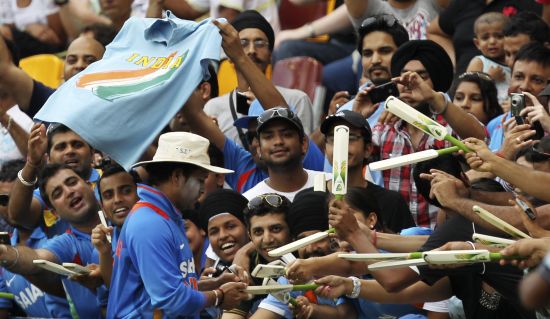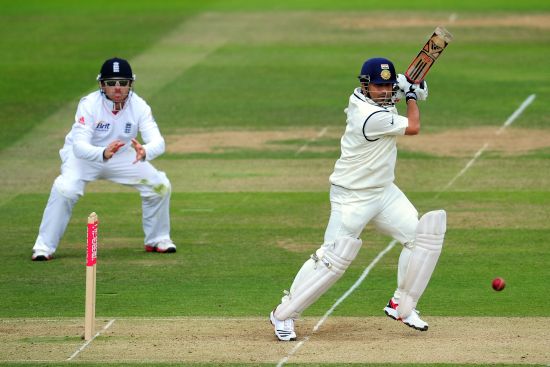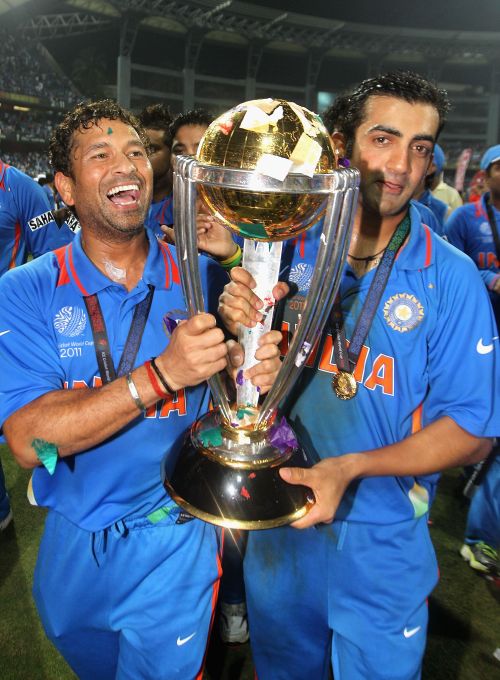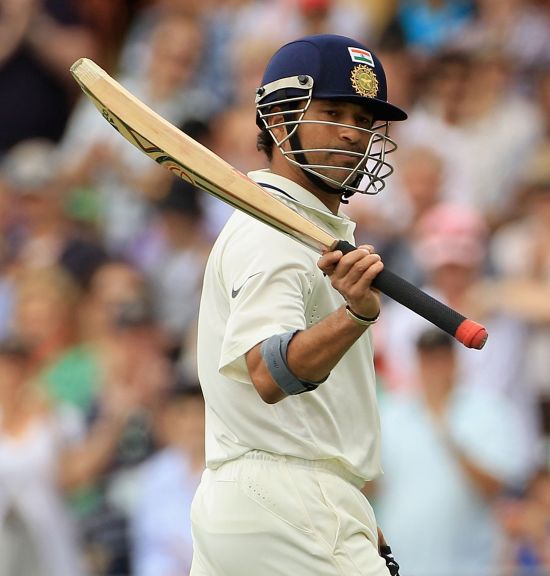Photographs: Jason O'Brien/Reuters Haresh Pandya
Cricket's run-machine not only broke numerous records and created a plethora of new ones during a marathon career, but, says Haresh Pandya, also ensured all predictions about him were proved true.
As a sportsman, Sachin Tendulkar was a truly universal hero. Not only India but the whole world was proud of him. There were few better sights in the world of sport – not just cricket, to be sure – than Tendulkar in full flow.
Why, some of his opponents often wished to see him play a big innings while hoping to restrict India to a score of around 200 or 250 runs. Of course, their joy knew no bounds when he got out cheaply. So prized was his wicket for any side, any bowler and, of course, his own team.
His fame reached every nook and cranny of the globe. Even those who do not know the ABC of sports, let alone cricket, are not unfamiliar with his name. And this is not a recent phenomenon. He has long been bracketed with the pantheon of sporting icons like Dhyan Chand, Jesse Owens, Babe Ruth, Muhammad Ali, Pele, Jack Nicklaus, Rod Lever, Ayrton Senna, Diego Maradona and many others of their ilk.
It is perfectly understandable if Tendulkar has been considered larger-than-life in the cricket-breathing India. How a grateful nation wanted Mahendra Singh Dhoni and company to win the 2011 World Cup for Tendulkar. As Yuvraj Singh revealed, he and his teammates had been keen to gift it to the master batsman.
Tendulkar surprisingly performed below par against weaker teams
Image: Sachin TendulkarPhotographs: Stu Forster/Getty Images Haresh Pandya
Of course, Tendulkar is not greater than the game or the country. No player, howsoever great, is. Nevertheless, it showed the love and respect of his teammates, as well as countrymen, for him. On his part, he was determined to win the quadrennial showpiece for India. Also, he had never been part of a World Cup-winning team and this was his best possible opportunity.
Tendulkar, who surprisingly performed below par against weaker teams like Bangladesh (28), Ireland (38), Netherlands (27), and the West Indies (2), was at his best versus England (120) and South Africa (111) in the preliminary round.
In the quarter-final against defending champion Australia he laid the foundation for India’s famous win with a solid 53.
In the semi-final against Pakistan, his uncharacteristic 85 helped India post a respectable total. No doubt he got at least five lives. But it was necessary for him to take some risk in order to sustain the tempo of scoring after Virender Sehwag’s explosive cameo. Maybe his ‘colleagues’, the angels (yes, the angels, because Tendulkar’s batting has long become a ‘sect’ from a ‘school’ and he is hailed as a cricketing god), watching his game from ‘above’ wanted him to bat on and on and complete his 100th international hundred.
He may have failed (18) in the final against Sri Lanka, but his very presence was enough to inspire Team India. And Dhoni, who played an unforgettable captain’s innings in company of Gautam Gambhir, was unlikely to miss this golden opportunity of winning the World Cup for his beloved teammate and country.
Tendulkar was architect of the country's Mission World Cup
Image: Sachin Tendulkar and Gautam GambhirPhotographs: Hamish Blair/Getty Images Haresh Pandya
Doubtless Tendulkar was a key architect of the country’s Mission World Cup. Of the 482 runs he scored at 53.55 in nine matches, 378 came against the five top teams of the world. Of course, even if India had failed to win in the final, just like in the 2003 edition, it would not have affected Tendulkar’s greatness.
Time and again he had proved his ability beyond doubt in all forms of cricket. He had scored really heavily and made centuries in all parts of the cricket world – on different pitches, in different conditions and situations and against various attacks.
As if he had not scored enough in the World Cup, he batted consistently and befitting the nature of Twenty20 cricket in the Indian Premier League that followed immediately.
Age is only a number and there cannot be a better example of this fact than Tendulkar. His passion for the game and his love for batting had not waned a wee bit even more than two decades after he first donned the national colours.
All-time great
Image: SachinTendulkarPhotographs: Hamish Blair/Getty Images Haresh Pandya
Tendulkar has not only broken numerous old records and created a plethora of new ones during his marathon career; he also ensured that almost all predictions made about him were proved true.
While sharing his views about the teenaged Tendulkar’s two brilliant Test hundreds down under in 1991-92, Don Bradman told me in a personal letter that “not since Graeme Pollock” had he seen such a “highly gifted” young batsman.
'He has nimble footwork and seems to have enough time to play his shots. For one so young, he isn’t afraid to play his shots; and he knows when to attack and when to defend. I see a very bright future form him,' wrote Bradman.
The Don’s admiration for Tendulkar grew manifold in the next few years. Bradman was convinced the little big Indian batted in the same way he did during his own playing days.
If at all any doubt was left, Bradman’s wife confirmed that Tendulkar’s batting style reminded her of her husband’s. Bradman’s admiration and affection for Tendulkar were such that he invited the Indian – a rare honour – to his abode in Adelaide on his 90th birthday. He subsequently included Tendulkar in his All-Time Great XI.





Comment
article